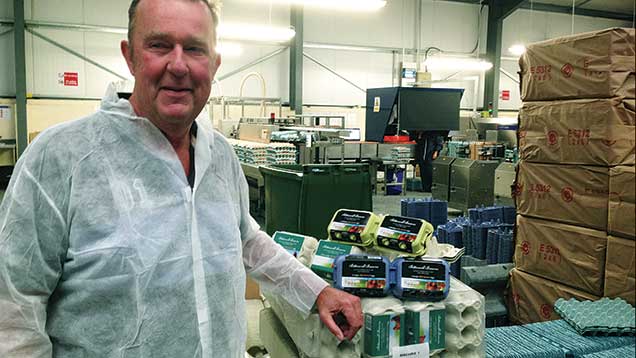How an egg farm is aiming to unlock major retail markets

With the largest central distribution centre for consumer goods in Europe less than five miles up the road, investing in standards and gaining British Retail Consortium certification was a move that made sense for Bitteswell Farms. Jake Davies reports.
Bitteswell Farms is an egg business slap bang in the middle of what those excitable types in retail logistics call the “golden triangle”.
The firm sits between the M1, M6 and the M69, making it one of the most central and well-connected sites in the UK. Not only this, but primary production all takes place on one site, near Lutterworth, just outside Coventry.
It is a stroke of good fortune for a business set up more than 50 years ago, when food would have rarely travelled far from where it was produced, and if you had described a supermarket to someone, they would have hardly believed you.
The site of a former RAF base nearby is today known as Magna Park, home to Asda’s biggest distribution centre. Lidl also has a base here, and other supermarkets all have major warehouses nearby.
For brothers Richard and Andy Higgins, this proximity is an important market to tap. They have embarked upon an improvement programme that has spanned their packing plant, seen the business move out of cage production entirely and focus wholly on free range.
It marks the end of a transformation of the farming side of the business. Before the ban on conventional cages came into force, in 2012, theirs was a farm focused both on caged hens and organic production.
The brothers decided the sustainable future of egg farming lay in standard free-range, so “met in the middle”, decommissioning their conventional cage, and abandoning organic.
“It was a change that we gave a great deal of thought to, but in the end decided it was the best thing for the business,” says Andy.
Bitteswell Farms now has some 120,000 birds split between three sites, with all the hens kept to Freedom Food and Lion Code standards.
A further unit rears pullets, and all the feed supplied to the birds is milled and mixed in house. A somewhat unusual part of the farm is a small airstrip for Andrew’s light aircraft, a sport cruiser.
Another interesting addition is llamas, which share the range with hens. “They are supposed to scare foxes away,” says Andy, though he is not convinced of their effectiveness.
One final investment in primary production was a new food-grade packing room, with the installation of a Moba 2500 grader with a 30,000 egg/hour capacity.
With this in place, the brothers decided to gain British Retail Consortium accreditation, to highlight the farm’s standards to potential new customers. “It takes a bit of doing,” admits Andrew Day, farms manager at Bitteswell. He led the change to standards and procedures that resulted in the farm recently winning BRC Food Grade A accreditation.
“We traditionally always reinvested profits in production. This is an investment in our standards and marketing,” says Andy.
It was borne out of slight frustration at the farm’s proximity to supermarkets’ distribution centres, but a distinct lack of retail contracts. The majority of eggs are currently sold wholesale to other businesses, and often end up back in the “golden triangle” for supermarket distribution.
In an age where food miles are considered all-important, he says it’s “madness” that half the farm’s eggs sell to other packers, before ending up back in Lutterworth. It is something the brothers are keen to amend.
BRC – gaining the standard
The British Retail Consortium is, principally, the trade body representing retailers large and small in the UK.
But it also offers food producers, packers and transporters a comprehensive accreditation scheme recognised by its members and retailers around the world.
Gaining certification is a good way to demonstrate high standards, according to BRC technical specialist John Figgins. “It increases customer confidence, and provides a standard that other auditors will often accept.”
Producer packers considering going for the standard first need to learn the ins and outs of it, and how it may apply to their business. From there, a “gap analysis” highlights areas in which the company may not be meeting requirements.
At this stage training staff may be appropriate – for example, the food accreditation requires a HACCP team (Hazard Analysis and Critical Control Point).
From here, a site is audited and, if satisfactory, it will gain BRC accreditation. Businesses will typically be re-audited annually, but if a grade drops to C or D, then the frequency is increased to every six months.

